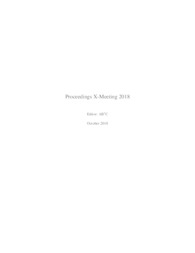Analysis of paspalum notatum transcriptome under drought condition.
Analysis of paspalum notatum transcriptome under drought condition.
Author(s): ARAKAKI, J. E.; MALAGO JUNIOR, W.; MUDADU, M. de A.; SANTOS, P. M.; FAVERO, A. P.; BORRA, R. C.; VIGNA, B. B. Z.
Publication year: 2018
Types of publication: Abstract in annals or event proceedings
Keywords: Forage, Forage grasses, Forrageira Tropical, Greenhouses, Paspalum Notatum
Observation
Some of Embrapa's publications are published as ePub files. To read them, use or download one of the following free software options to your computer or mobile device. Android: Google Play Books; IOS: iBooks; Windows and Linux: Calibre.
Access other publications
Access the Agricultural Research Database (BDPA) to consult Embrapa's full library collection and records.
Visit Embrapa Bookstore to purchase books and other publications sold by Embrapa.

